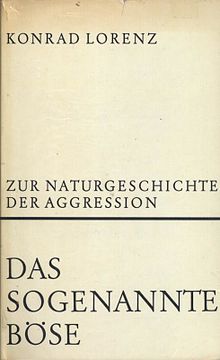
Ethology is a branch of zoology that studies the behaviour of non-human animals. It has its scientific roots in the work of Charles Darwin and of American and German ornithologists of the late 19th and early 20th century, including Charles O. Whitman, Oskar Heinroth, and Wallace Craig. The modern discipline of ethology is generally considered to have begun during the 1930s with the work of the Dutch biologist Nikolaas Tinbergen and the Austrian biologists Konrad Lorenz and Karl von Frisch, the three winners of the 1973 Nobel Prize in Physiology or Medicine. Ethology combines laboratory and field science, with a strong relation to neuroanatomy, ecology, and evolutionary biology.

Konrad Zacharias Lorenz was an Austrian zoologist, ethologist, and ornithologist. He shared the 1973 Nobel Prize in Physiology or Medicine with Nikolaas Tinbergen and Karl von Frisch. He is often regarded as one of the founders of modern ethology, the study of animal behavior. He developed an approach that began with an earlier generation, including his teacher Oskar Heinroth.

Solomon, also called Jedidiah, was a monarch of ancient Israel and the son and successor of King David, according to the Hebrew Bible or Old Testament. He is described as having been the penultimate ruler of an amalgamated Israel and Judah. The hypothesized dates of Solomon's reign are from 970 to 931 BCE. After his death, his son and successor Rehoboam would adopt a harsh policy towards the northern tribes, eventually leading to the splitting of the Israelites between the Kingdom of Israel in the north and the Kingdom of Judah in the south. Following the split, his patrilineal descendants ruled over Judah alone.
In psychology and ethology, imprinting is any kind of phase-sensitive learning that is rapid and apparently independent of the consequences of behaviour. It was first used to describe situations in which an animal or person learns the characteristics of some stimulus, which is therefore said to be "imprinted" onto the subject. Imprinting is hypothesized to have a critical period.

Nikolaas "Niko" Tinbergen was a Dutch biologist and ornithologist who shared the 1973 Nobel Prize in Physiology or Medicine with Karl von Frisch and Konrad Lorenz for their discoveries concerning the organization and elicitation of individual and social behavior patterns in animals. He is regarded as one of the founders of modern ethology, the study of animal behavior.

On Aggression is a 1963 book by the ethologist Konrad Lorenz; it was translated into English in 1966. As he writes in the prologue, "the subject of this book is aggression, that is to say the fighting instinct in beast and man which is directed against members of the same species."
King Solomon's Ring may refer to:
The year 1949 in science and technology involved some significant events, listed below.

The Seal of Solomon or Ring of Solomon is the legendary signet ring attributed to the Israelite king Solomon in medieval mystical traditions, from which it developed in parallel within Jewish mysticism, Islamic mysticism and Western occultism.
Cuteness is a type of attractiveness commonly associated with youth and appearance, as well as a scientific concept and analytical model in ethology, first introduced by Austrian ethologist Konrad Lorenz. Lorenz proposed the concept of baby schema (Kindchenschema), a set of facial and body features that make a creature appear "cute" and activate ("release") in others the motivation to care for it. Cuteness may be ascribed to people as well as things that are regarded as attractive or charming.
"Fixed action pattern" is an ethological term describing an instinctive behavioral sequence that is highly stereotyped and species-characteristic. Fixed action patterns are said to be produced by the innate releasing mechanism, a "hard-wired" neural network, in response to a sign/key stimulus or releaser. Once released, a fixed action pattern runs to completion.
On 19 October 2006, the Royal Institution of Great Britain named the 1975 short story collection The Periodic Table, by Primo Levi, the best science book ever. After taking nominations from many scientists in various disciplines, authors, and other notable people, the Royal Institution compiled a shortlist of books for consideration. This shortlist was presented to the public at an event held at Imperial College and the audience voted to determine which book was "the best."

Displacement activities occur when an animal experiences high motivation for two or more conflicting behaviours: the resulting displacement activity is usually unrelated to the competing motivations. Birds, for example, may peck at grass when uncertain whether to attack or flee from an opponent; similarly, a human may scratch their head when they do not know which of two options to choose. Displacement activities may also occur when animals are prevented from performing a single behaviour for which they are highly motivated. Displacement activities often involve actions which bring comfort to the animal such as scratching, preening, drinking or feeding.

Adolf Lorenz was an Austrian orthopedic surgeon.

The Konrad Lorenz Institute for Evolution and Cognition Research (KLI) is an international center for advanced studies in the life and sustainability sciences. It is a "Home to Theory that Matters" that supports the articulation, analysis, and integration of theories in biology and the sustainability sciences, exploring their wider scientific, cultural, and social significance. The institute is located in Klosterneuburg, near Vienna, Austria. Until 2013, the institute was located in the family mansion of the Nobel Laureate Konrad Lorenz in Altenberg. Lorenz' work laid the foundation for an evolutionary approach to mind and cognition.

Wolfgang Wickler was a German zoologist, behavioral researcher and author. He led the ethological department of the Max Planck Institute for Behavioral Physiology from 1974, and he took over as director of the institute in 1975. Even after he was given emeritus status, he remained closely associated to the institute in Seewiesen and ensured its smooth transition under the newly created Max Planck Institute for Ornithology.

Man Meets Dog is a zoological book for the general audience, written by the Austrian scientist Konrad Lorenz in 1949. The first English-language edition appeared in 1954.

Bite inhibition, sometimes referred to as a soft mouth, is a behavior in carnivorans whereby the animal learns to moderate the strength of its bite. It is an important factor in the socialization of pets.
The Konrad Lorenz Forschungsstelle (KLF) is a research facility in Grünau im Almtal, maintained jointly by private and public entities. The KFL is dedicated mainly to behavioral biology of birds and named after the Nobel laureate Konrad Lorenz, who established the facility in 1973.
The Konrad Lorenz Institute of Ethology is a research institute in Vienna, Austria, dedicated to studying behavioral biology and the links between animal behaviour and conservation. Founded by the animal photographer Otto Koenig and his wife, the illustrator Lilli Koenig as “Biologische Station Wilhelminenberg” in 1945, it was later named after the Nobel laureate Konrad Lorenz and incorporated into the University of Veterinary Medicine Vienna in 2011.












